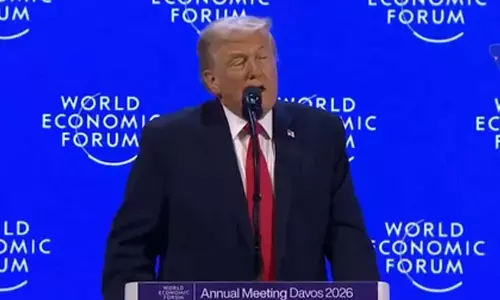Civic sense that matters

When Nani A Palkhiwala, eminent Jurist and Constitutional expert asked a Japanese Minister, “Mr. Minister, if you will forgive my saying so, we Indians are no less intelligent than the Japanese. How come that you are on the top of the world and we are still languishing in squalor and poverty?” The immediate answer from the Japanese Minister,
When Nani A Palkhiwala, eminent Jurist and Constitutional expert asked a Japanese Minister, “Mr. Minister, if you will forgive my saying so, we Indians are no less intelligent than the Japanese. How come that you are on the top of the world and we are still languishing in squalor and poverty?” The immediate answer from the Japanese Minister, which was pregnant with wisdom, was, “My friend, in Japan, we have 100 million citizens. In India, you have 600 million individuals.” The Japanese Minister’s observation clearly disclosed that discipline and etiquette are the most important requirements for development of a country as much as intelligence and intellectual calibre. In the absence of good civic sense, there can be no life worth living.
Let us discuss here certain issues or areas in which we miserably fail to display civic sense or observe etiquette. In certain countries footpaths are for the exclusive use of pedestrians while roads are meant only for vehicular traffic. When I walked a few yards in a road margin in Montreal (Canada) where a portion of the footpath was temporarily closed for repair, just following the footsteps of two local ladies, I was caught by the police for interrogation along with the two ladies.
After the ladies were penalised despite pleas for exoneration, the police asked me whether I didn’t observe the board indicating closure of pedestrian path. When I pleaded that I didn’t observe it in my hurry to reach the conference place in time I was let off with a polite advice to observe traffic rules strictly as they are meant for our security only and wishing me ‘good day’.
The high civic sense and road sense made life in certain cities of the world safe, secure and comfortable. The high rise buildings and wide roads of cities in foreign countries favourably compare with those in Indian cities. Then why there are no traffic problems in foreign countries while no day passes in the Indian cities without at least a few road accidents? It is due to the total absence of road sense in India.
Nirad C Chaudhary regrets while living in old Delhi that, “After independence, for four years, I saw people easing themselves in this park in the morning, sitting in rows.” It was no doubt a pitiable sight. But six decades after independence when I inspected the toilets constructed under Low Cost Sanitation Scheme in a town in order to totally eradicate open defecation I was surprised to hear a college lecturer, who didn’t hesitate to say that open defecation was their family tradition from which they didn’t want to break, and converted the toilet into a storeroom to keep their waste materials. What is the level of his civic sense! Nirad C Chaudhuri says that “A man who cannot endure dirt, dust, stench, noise, ugliness, disorder, heat, and cold has no right to live in India.” Certainly, it is our civic sense.
I visited the State Central Library and opened the pages of a volume of Encyclopaedia Britannica and was shocked to see certain pages neatly cut off with a blade by a user and took away the papers. The user of Encyclopaedia Britannica is generally expected to be an educated person with a high sense of values and with full knowledge of the value of such a costly and highly informative book. How could he cut off the pages from such a valuable book and totally ignore the loss that it creates to the library and other users? It was shocking that he didn’t think for a second as to the consequences of his barbaric act. It is nothing but the total absence of civic sense. It escaped his notice that by writing down the information he required from the book he would learn and remember it for long and that it would be useful to him throughout his life.
When the email address of the President of International City Managers’ Association in New York changed, I corresponded with the Town Manager of Queen Creek Municipality in Arizona State in the USA. He and others, who have not seen my face, had taken several pains to locate him and finally furnished his email address. That is their civic sense. When I asked my clerk, whom I appointed to the post, to get some official information from someone, he absconded from duty for 10 days and returned after I got it otherwise. That was his civic sense and sense of gratitude towards an officer who gave him life by appointing him in a permanent post in the government.
I received a complaint from a resident that the drain was blocked with the result that wastewater was stagnated in the drains and was overflowing on the roads and in front of residential houses. When I personally inspected the area I was shocked that the complainant was responsible for the problem since it was the sand he dumped in the drain that prevented the free flow of wastewater that resulted in stagnation of drain water. Stormwater drains are meant for the free flow of wastewater to the disposal point or into the major disposal drain.
But several petty shop owners use the drains for throwing all waste paper, coconuts, etc which prevent the free flow of wastewater and that ultimately results in the overflow of wastewater on the roads. Although the residents are responsible for the sorry state of affairs, they complain against the officials. That is the civic sense in India.
My uncle and I ate bananas in a hotel and I asked him to come out to throw the peels into the dustbin. He simply took away the banana peels from my hand and placed them in between the pages of a newspaper on the table. Another visitor to the hotel took the paper to read and the peels fell on his chest. My uncle said without remorse, “Our people have no civic sense. They don’t at least know that the peels should be thrown into the dustbin,” as if he got a civic sense.
Besides these examples, picking up quarrel with others for no reason, driving vehicles on the wrong side, wrong parking of vehicles as a sign of greatness, resorting to fighting by vulgar display of courage over bickerings, exaggerating ignorable lapses in others being totally unaware of our own criminal offences, use of harsh and intemperate language as a social status and all such evils form the cardinal principles of human conduct in our society. Is Bertrand Russell right in observing that “It must be appallingly tragic to be civilised and educated and belong to such a country as India?”
When can we expect to improve the situation?
By: Dr Chaganti Nagaraja Rao














